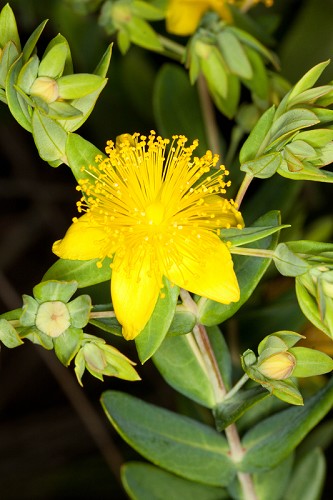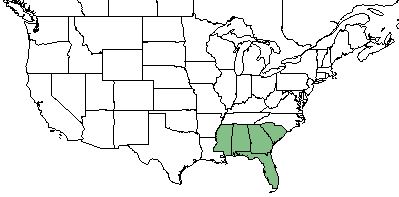Difference between revisions of "Hypericum myrtifolium"
(→Description) |
|||
| Line 31: | Line 31: | ||
==Ecology== | ==Ecology== | ||
===Habitat=== <!--Natural communities, human disturbed habitats, topography, hydrology, soils, light, fire regime requirements for removal of competition, etc.--> | ===Habitat=== <!--Natural communities, human disturbed habitats, topography, hydrology, soils, light, fire regime requirements for removal of competition, etc.--> | ||
| + | ''H. myrtifolium'' is naturally found in fresh-water communities and marshes infrequently. <ref name= "Hilmon"> Hilmon, J. B. (1964). "Plants of the Caloosa Experimental Range " U.S. Forest Service Research Paper SE-12 </ref> | ||
===Phenology=== <!--Timing off flowering, fruiting, seed dispersal, and environmental triggers. Cite PanFlora website if appropriate: http://www.gilnelson.com/PanFlora/ --> | ===Phenology=== <!--Timing off flowering, fruiting, seed dispersal, and environmental triggers. Cite PanFlora website if appropriate: http://www.gilnelson.com/PanFlora/ --> | ||
Revision as of 15:13, 22 May 2018
| Hypericum myrtifolium | |
|---|---|

| |
| Photo by the Southeastern Flora Plant Database | |
| Scientific classification | |
| Kingdom: | Plantae |
| Division: | Magnoliophyta - Flowering plants |
| Class: | Magnoliopsida - Dicots |
| Order: | Theales |
| Family: | Clusiaceae |
| Genus: | Hypericum |
| Species: | H. myrtifolium |
| Binomial name | |
| Hypericum myrtifolium L | |

| |
| Natural range of Hypericum myrtifolium from USDA NRCS Plants Database. | |
Contents
Taxonomic Notes
Synonyms: none
Varieties: none
Description
H. myrtifolium is a native perennial shrub that is a member of the Clusiaceae family. [1] It is most recognizable by its clasping leaves, which are usually glaucous. [2]
Distribution
H. myrtifolium is found mainly in Florida, but can also be found sparingly in southern Alabama, Gerogia, and Mississippi. [1]
Ecology
Habitat
H. myrtifolium is naturally found in fresh-water communities and marshes infrequently. [3]
Phenology
H. myrtifolium flowers from May to June as well as November to December. [4].
Conservation and Management
Cultivation and restoration
Photo Gallery
References and notes
- ↑ 1.0 1.1 USDA Plants Database URL: https://plants.usda.gov/core/profile?symbol=HYMY
- ↑ Carr, L. G. (1940). "Further notes on coastal floral elements in the bogs of Augusta County, Virginia." Rhodora 42(495): 86-93.
- ↑ Hilmon, J. B. (1964). "Plants of the Caloosa Experimental Range " U.S. Forest Service Research Paper SE-12
- ↑ Panflora URL: http://www.gilnelson.com/PanFlora/